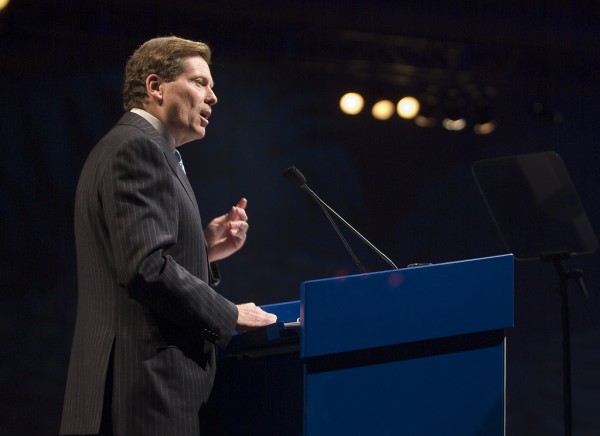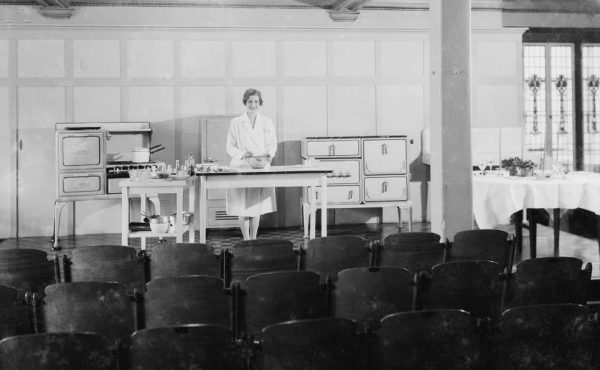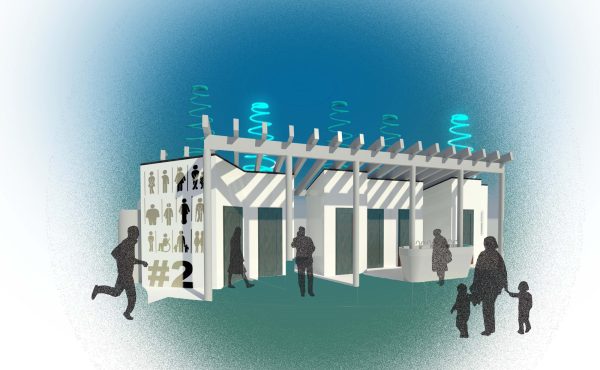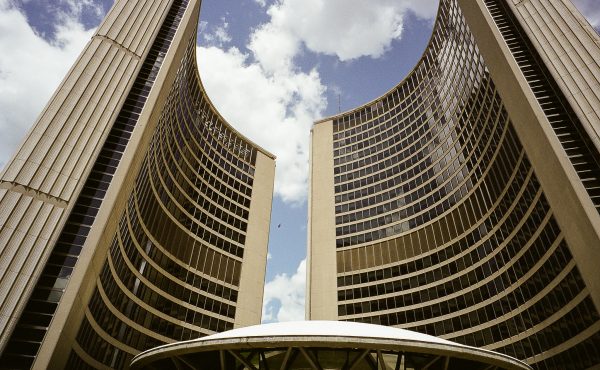If you situate your views in the political middle or slightly to the right, and if you find yourself disgusted with Rob Ford’s four-year three-ring circus, John Tory must look like an exceedingly attractive sorta-kinda-maybe candidate. Just in time for the political barbeque season, Tory last week finally acknowledged that he’s “thinking” about a mayoral run in 2014. The news that he’s mulling over the possibility of a second kick at the can is surely succor to a lot of ears.
Consider the architecture: he’s a bone fide conservative, so he presumably won’t raid the municipal piggy bank. He’s got name recognition to die for; has been involved (albeit as an interlocutor) in all the major local debates of the past several years; and heads a non-partisan civic advocacy group that has taken a relatively progressive stance on the need for both new transit investment as well as additional revenue tools. And, lest we forget, Tory is blessed with the ability to engage in higher order thought, a talent that was not bestowed on the incumbent.
So what’s not to love?
In fact, when pollsters asks how Tory would do in a head-to-head contest with Mayor Rob Ford, the spread runs almost 20 points in his favour, according to a Forum poll conducted last week for The Toronto Star. The same survey also shows Tory also gaining on NDP MP Olivia Chow, who has taken to publicly proclaiming her love of the city (an almost sure sign of a looming mayoral run).
Yet Tory, who started his career as a political operative, surely understands the mischief embedded in such polls. After all, they only ask respondents to handicap the cage match. The pollsters don’t link candidate preference to a ballot question or a set of key issues, because such scenarios are impossibly speculative.
It’s true that voters place a lot of stock in a candidate’s comportment, values, appearance, and other personal attributes. But elections are also about issues; by the time voting day rolls around, every candidate will be associated in the public mind with certain positions on a range of core policy planks. And that is where things could get tricky for Tory, in almost exactly the same way they’ll be tricky for Premier Kathleen Wynne when she seeks re-election next year.
In an almost cosmic coincidence, these former heavyweight political rivals — Wynne beat Tory, then the PC’s leader, in Don Valley West in the 2006 provincial election — could find themselves lugging the same policy boulder (new transit taxes) up the same brutally steep hill.
Whether either can succeed is anything but assured.
Tory’s dilemma, in a nutshell, is this: having stated countless times that the province needs to adopt new taxes and levies to pay for new transit in the GTA, how does he stay true to his word while winning over enough votes from the centre and centre right to take out Ford?
For the purposes of this analysis, I will assume that Tory could mop up a non-trivial number of votes in that ideological no-man’s land between the Liberals and the NDP. I’ve heard enough progressive people tell me they don’t think the city is prepared for another NDP mayor to conclude that Tory could be competitive with the same sort of soft centre-left voter who tends to like Karen Stintz.
In effect, he becomes the de facto Liberal candidate, promising to erect a big civic tent that can accommodate right-thinking middle-class downtown/midtowners, as well as a respectable proportion of suburban voters.
Tory, if he runs, almost certainly will position himself as a unifying ur-leader who pledges to end the downtown-suburb feuding that has characterized the Ford era. But he can hardly accomplish that laudable goal by shilling for new taxes, even indirectly (the revenue tools decision lies mostly with the province). What’s more, Tory is still a product of his political clan, so he’s going to have little choice but to throw the party enough red meat to justify the inevitable requests for cash.
My guess is that if Tory jumps in, we’ll see a platform that is actually quite fiscally conservative, with promises to sell assets, boost out-sourcing and find even more budget cuts (“efficiencies”). He’ll then tell voters that the resulting savings will help offset any additional transit levies and taxes.
I fully expect Wynne to take a similar approach, although she has many more fiscal levers at her disposal. Of course, there’s an alternative plan: transportation minister Glen Murray — who is charged with taking the Metrolinx recommendations and turning them into a government policy agenda – could do what President Obama did last fall with the Keystone XL approval and declare that all the required analysis and consultation simply won’t be cooked in time for the 2014 election, thereby relieving Wynne of the misery of campaigning on a promise to boost taxes.
If the Liberals succumb to temptation and try to punt the revenue tools discussion into the next term, Tory would find himself in the odd position of betting all on a last run for high public office, only to be then stripped (relieved?) of the one policy issue that both motivates and bedevils him. Consequently, he’d get to tell Torontonians that he has to wait, like the rest of us, for the province to take a stance before he responds (i.e., retreating to Chow’s default non-position on transit taxes).
Would that answer wash in the context of a campaign that will be filled with attack ads and tax cut promises? Hard to say. But Ford, in the event, would have to work harder to paint Tory, his main foe, as a tax-and-spend conservative.
However the Wynne Liberals choose to position themselves, I find myself increasingly skeptical about their chances in 2014, even if they do opt for a play-it-safe election strategy. I’d say it’s entirely plausible that we could end up with Tim Hudak as premier, John Tory as mayor, and a pledge from a new hard-right provincial government to do a major re-think of both Metrolinx and the Big Move.
Imagine: two conservatives, one progressive, the other not so much, fighting over the region’s gridlock woes. I can’t even begin to imagine how that story ends.






8 comments
John Tory’s major issue is that he is (perhaps to his credit) just not a very good politician. He’s too thoughtful, ruminative, and open to complexity. His current twin roles as head of Civic Action and a talk show hosts are the perfect jobs for his personality, and he makes a good contribution to the city through them. I hope he sticks to them.
It ends with Toronto getting screwed worse than it already is, that’s how.
I think the bigger problem for Torontonian is that, in a four-way race or even a three-way race, Ford will have a very good chance of winning again (with his unassailable/undividable 30%+ Ford-nation votes). Imagine a Ford/Hudak/Haper combo, yike!
Yu — 30% win never will you a race. The nature of elections is that even on one side of the spectrum voters tend to galvanize (See Hall, Miller 2003). Ford is done like dinner in any election scenario. And the Left is pretty adamant of not splitting the vote this time. Much more likely the right splits the vote this time around.
And a hypothetical to keep in mind: had the Ontario Liberal leadership tilted the other way, we’d not only have Premier Pupatello, we might well have *Kathleen Wynne* emerge as the anti-Ford mayoral frontrunner in lieu of Ford, Stintz, Chow, et al….
In lieu of *Tory*, not Ford. (Typo.)
Matt,
“Ford is done like dinner”. I wish you are right, but I cannot share your optimism. Let us mark the words and revisit next year.
John Tory stated ” If anyone tells you that we don’t need revenue tools for transit they aren’t being honest.” John is an honest man and a strong leader you won’t see him go back on his word, or back down on transit funding tools. Some will say that’s bad politicking — I believe it is good leadership. We don’t need another politician who doesn’t get anything done. Gridlcok is having an impact on our long-term economic viability, we can’t put off the key issue of transit funding and John understands that. At this point Toronto needs a leader who will say what needs to be said and do what needs to be done. The time is right for a John Tory.